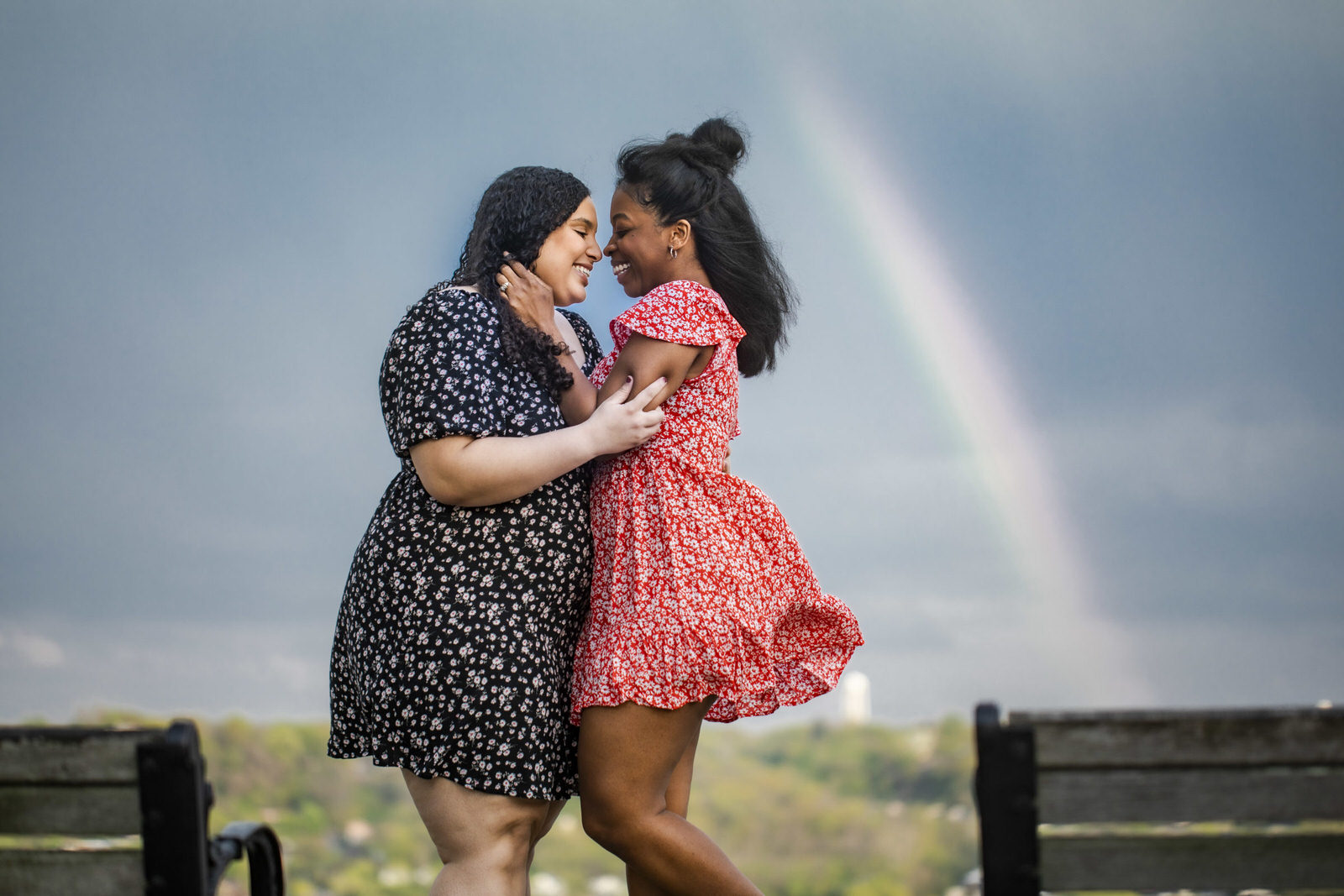You’ve probably heard the word “inclusive” thrown around a lot lately, and not just in the “all-inclusive” sense. You may be wondering: how can I make my wedding more inclusive?
The great thing about planning an inclusive wedding, is that you can throw so many traditions out the window. You can feel proud of the mindful celebration you’re planning – supporting those who align with your values, uplifting marginalized communities, making your friends and family feel seen, and hosting an event – the beginning of your marriage! – that stands for GOOD.
So how exactly can you plan an inclusive wedding? I’ve started with 5 ideas that will make your day more inclusive! And a whole bunch of actionable items! From using inclusive language, to hiring inclusive vendors, to affirming all attire choices and more – this post covers a lot!
Have I missed anything? Feel free to share in the comments!
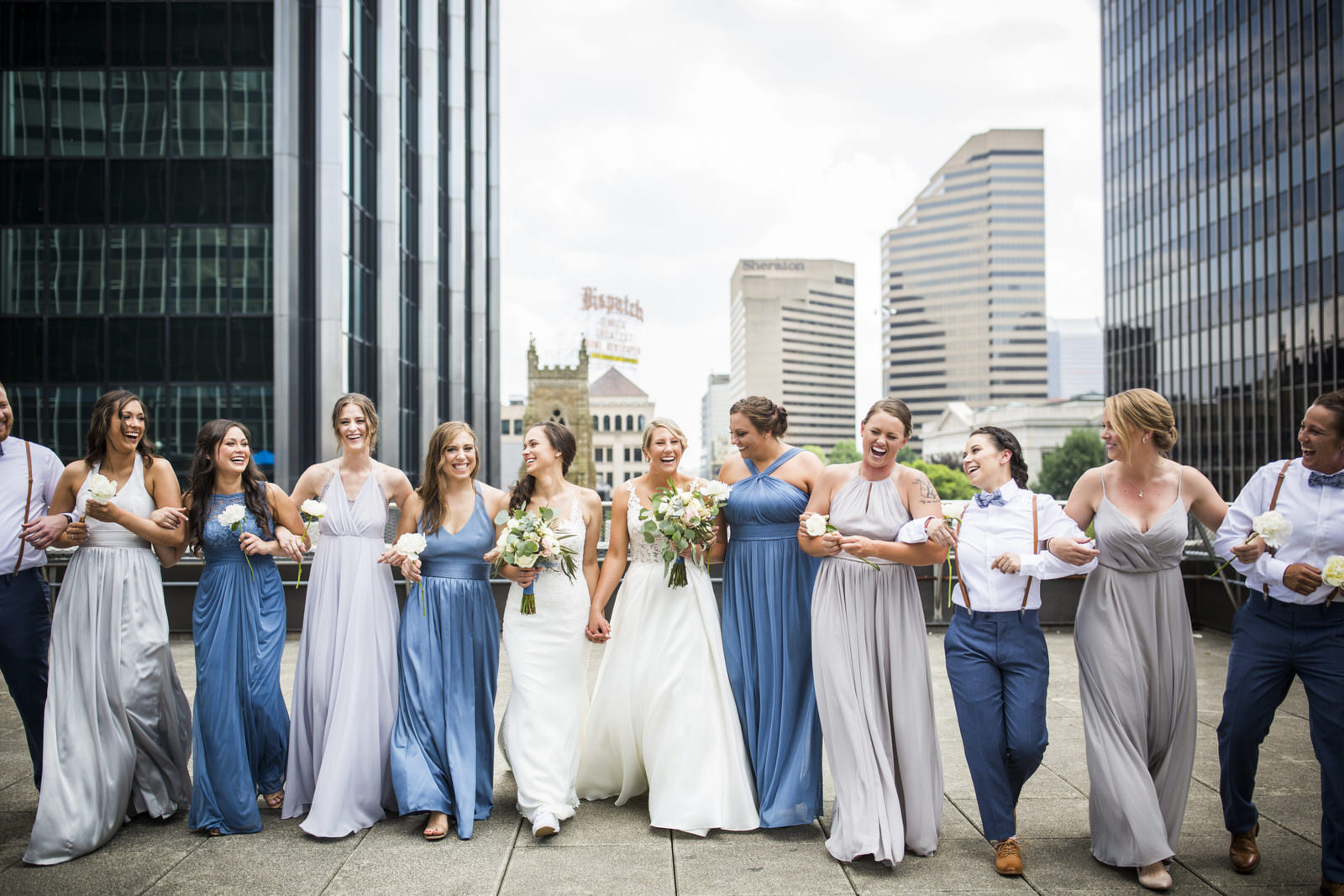
1. Use Inclusive Language
- Avoid using pre-fixes in your wedding invitations and on place cards, and be sure to use both first names. For instance, no “Mr. and Mrs. John Doe” – the Mrs has a first name too! Don’t erase them.
- Use “Wedding Party” instead of Bridal Party. In fact, stop calling everything “bridal.” After all, some weddings don’t have brides at all. And even for weddings with a bride and a groom, the party isn’t just about the bride. You can also use fun terms like: team, group, or VIPs. (But please don’t use the word “tribe.” It’s appropriative.)
- Use “Attendants” instead of Bridesmaids / Groomsmen. Not all your people will identify as bridesmaids or groomsmen. And these days, it’s common to have all genders on either side. “Attendants” captures them all.
- Be empowered to use alternatives to Bride and Groom. If these terms don’t feel right for you or your partner, you can consider Broom, Marrier, Lovebird, Spouse, Partner, just to name a few… and don’t be afraid to convey to your vendors and everyone in attendance how you want to be addressed.
- Choose readings with inclusivity in mind. If you’re having readings at your ceremony, choose passages written by underrepresented folks, and messages that reflect equality and honor marginalized communities.
- Provide descriptions of cultural or religious traditions your guests may not be familiar with. These can be explained ahead of time on your wedding website, or included on a page in your program.
- Encourage your vendors to use inclusive language throughout the day too. For instance, ask your DJ not to address the crowd as “ladies and gentlemen”, instead they can use “folks”, “crowd”, “dancers”, “guests”, “party people”, etc. Instead of “you may now kiss the bride,” consider “You may now kiss each other.” Relay your pronouns to your vendors, and also, check in on your vendors’ pronouns too!
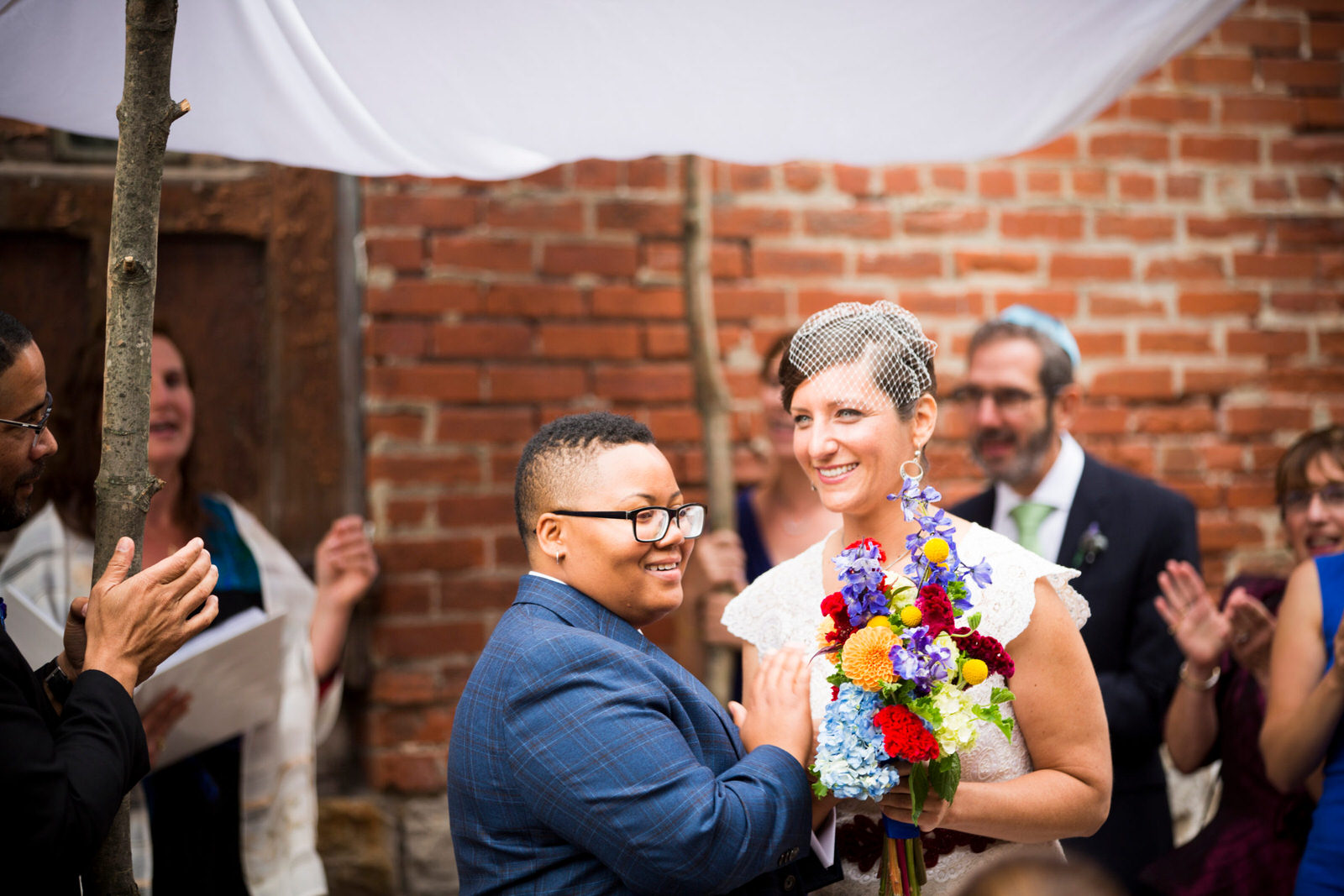 2. Hire Inclusive Vendors
2. Hire Inclusive Vendors
- Choose vendors that share your values. One of the first things you do when you begin planning your wedding is choosing your vendor team that will make your dreams a reality. You want to support and uphold businesses that align with values that are important to you.
- If you’re looking for recommendations for inclusive wedding vendors, please reach out to me!
- Choose vendors that regularly celebrate diversity. If inclusivity is important to you (and it should be!) hire vendors that also share that value in a big way. For instance, look for vendors that showcase LGBTQ+ couples, couples of color, and couples of all body types on their websites and social media in a prominent way. If you don’t see those couples represented on their website and social media, or if they’re not showcased prominently, don’t be afraid to ask them why that is?
- There are some venues that publicly refuse to host LGBTQ+ weddings. Don’t have your wedding there.
- Does your venue still use the terms “bridal suite” and “groom’s suite” to name their getting ready areas? Challenge them to be more inclusive and go neutral. Choose a venue that has a gender-neutral bathroom.
- Choose vendors that use inclusive language on their website, marketing and contracts. It starts with not plastering their website with the word “brides” all over it, and it continues with using neutral language on the contact form and in their contracts, and asking for your pronouns.
- Choose vendors from underrepresented communities. When possible, try to support black-owned businesses, women-owned businesses, and LGBTQ+ owned businesses.
- If you need recommendations for these vendors in the Columbus area, please reach out to me!
- Hire vendors who are affirming of underrepresented couples. For instance, it’s not enough to be “LGBTQ friendly”, look for vendors that are affirming: those will advocate for their couples, care about how current events affects them, and aren’t afraid to take a stand. Look for a vendor that will proudly say Black Lives Matter.
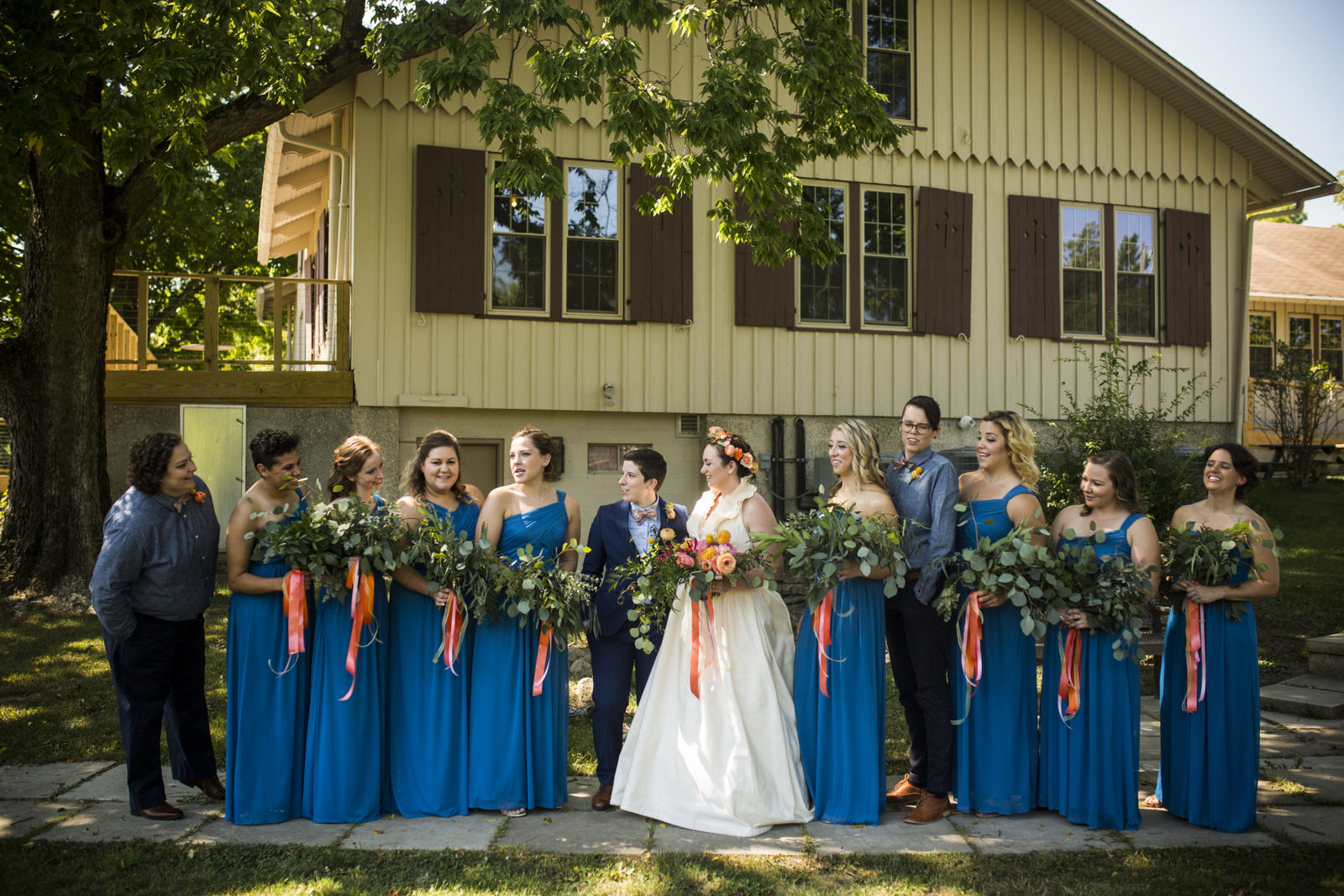 3. Affirm Inclusive Attire
3. Affirm Inclusive Attire
- Suits vs Dresses: everyone has a preference. Ask your wedding party members what they want to wear! Let them choose an outfit they feel comfortable in, attire that reflects their style. Yes, you can guide them in the general color and style as it fits with your wedding, but don’t force someone to wear a dress who would never. And by the way, same goes for the couple getting married. Just because you’re a bride doesn’t mean you have to wear a dress!
- Allow attendants to choose their own style/cut of dress or suit. This has become pretty common in recent years, but instead of choosing one specific style for everyone to match, choose the brand, color(s) and maybe material, and then let your attendants go shopping for attire that fits their comfort and style!
- Use inclusive suit makers. Source your suits from companies that make suits for more than just men. Pursuit is a great local company here in Columbus that is makes suits for all genders!
- Offer to help cover financial costs for attendants in need. Being in weddings is expensive. Your attendants are your closest people, so you probably know if the costs associated with being in your wedding are out of reach for them or will be a huge burden. Offer to help them by purchasing their attire or paying for their hair and makeup. Or simply put it out there to the whole group that you’re able to help if folks need it.
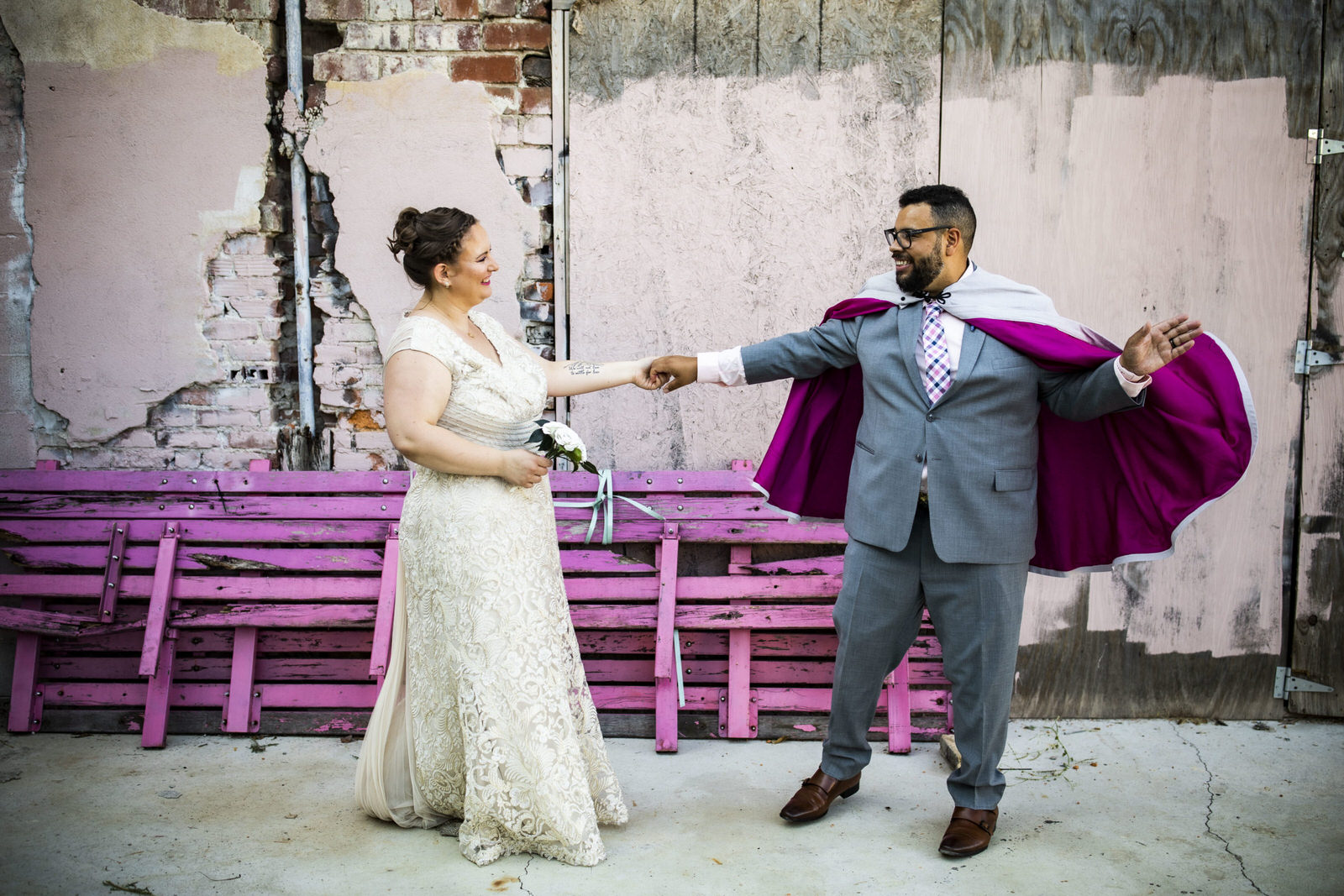
4. Reimagine Gendered Traditions
- Have both your parents walk you down the aisle, or a non-parent! You don’t have to have just one parent do this! It’s actually Jewish tradition for both parents to walk their child down the aisle. You may even want to include step-parents and siblings in some way.
- Walk down the aisle together or simultaneously. It’s a beautiful thing to watch you walk into marriage together. You could meet halfway down the aisle, or you could have two aisles to walk down at the same time.
- Guests don’t have to choose a side at the ceremony. Invite guests to sit wherever they wish; regardless of which side they may be closer to, they’re all here together.
- Include all genders on either side of the wedding party. The bride has a brother? Have him stand with her. Mix it up! And don’t force opposite-sex pairings.
- Parent Dances: There’s no reason a bride has to dance with her dad, or a groom has to dance with his mom. You can dance with whichever parent you like, or even both! And just like in walking you down the aisle, you could incorporate step-parents, grandparents and siblings too. You can really dance with whoever you’re close to.
- Anyone can participate in gendered traditions. For instance, you can both break the glass! All genders can be invited to catch the bouquet!
- Make your pre-wedding events inclusive, too. Have a couples’ shower, and a bach party, where everyone can feel included on these festivities.
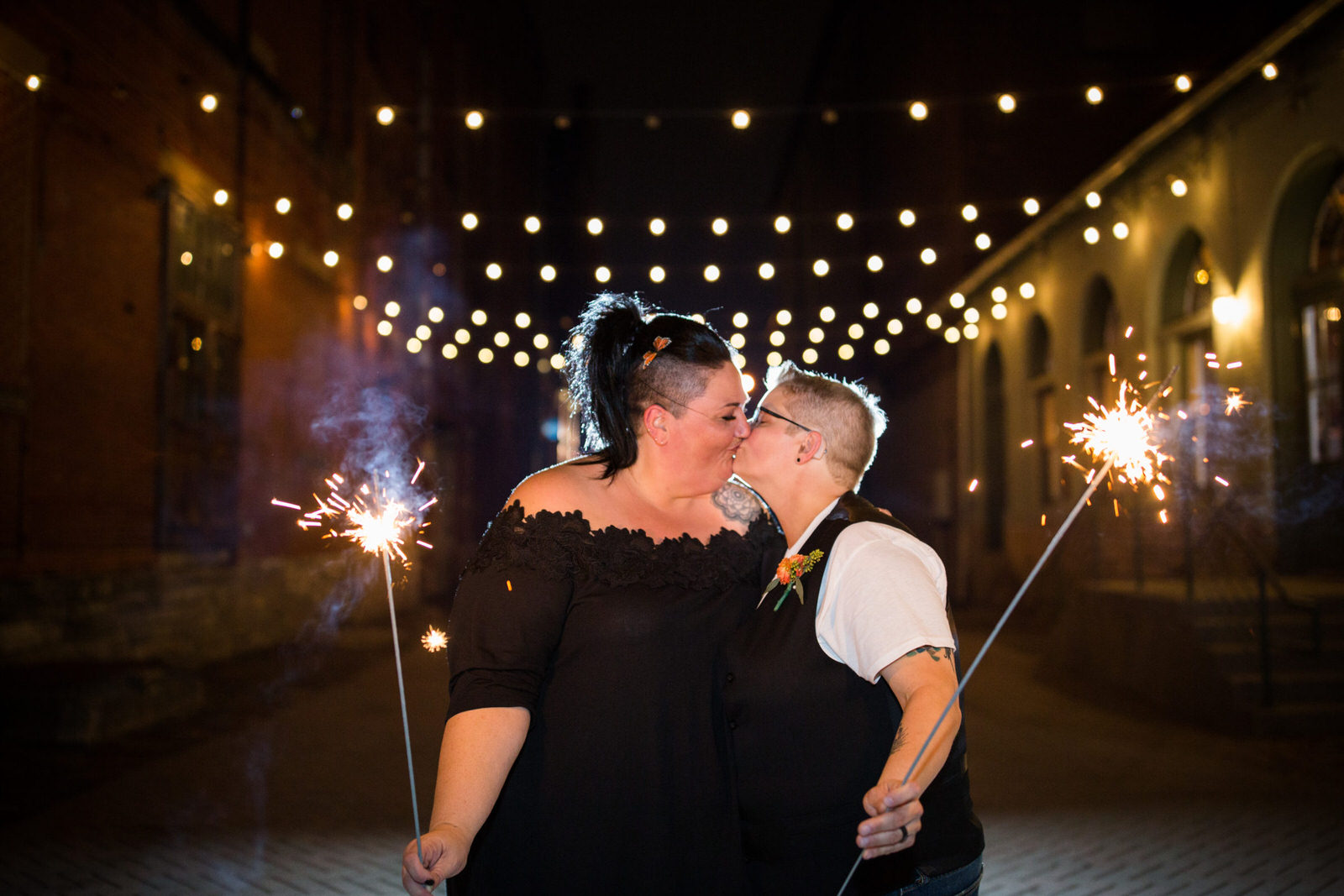
5. Be Mindful of Your Guests’ Needs
- Cater to dietary restrictions. This is pretty well understood these days, but don’t wait for your guests to bring it up. Ask for them on their RSVP card, and then make sure your caterer can accommodate. Request your vegetarian meal as part of your tasting and make sure it’s amazing! Have ingredient lists available at the reception, even have them on display if you’re having a buffet.
- Alternative activities and entertainment. Some people don’t care for dancing that much. Consider setting out board games, or even arranging for alternative entertainment like tarot readings, trivia night, or a comedian. Photobooths are still a thing too! In pandemic times, these alternatives to dancing have been especially popular!
- Make gifts optional and encourage alternatives, like donating to a favorite charity, gifting an experience, or providing a service they can do themselves.
- Have a sober-friendly wedding by offering a non-alcoholic signature drink, making sparkling grape juice available for toasts, and supplying vouchers for free Ubers, Lyfts, etc. My photog friend Carly Romeo wrote a more detailed blog post on this topic earlier this week! Check it out here.
- Consider the kiddos and the parents. Whether you’re including kids at the party, or you’re keeping it adults-only, consider providing on-site childcare so parents can have fun without worrying about their little ones. If kids are included at the party, provide age-appropriate activities for them.
Similarly, if you have parents of babies attending, or in your wedding party, you may want to set up pumping or nursing spaces for them. If you have an attendant who is pumping for a baby, build pumping breaks into your schedule. - Ensure a safe space for all by having conversations with problematic guests ahead of time.
- Plan an inclusive music playlist. Look at the lyrics of the songs you’ve chosen for your playlist. Do they contain racist, homophobic or misogynist language? Then make sure they’re not included.
- Provide individual masks and hand sanitizers during these pandemic times, at least. And please get your vaccine!! In fact, I have some weddings this year that are asking only vaccinated guests to attend.
- Offer the option for guests to attend virtually, while in a pandemic or not! Hopefully the popularity of Zoom ceremonies will normalize them for the future, because there will always be folks that can’t attend, or you can’t invite. This is especially helpful if you want to keep your guest list small.
- Accessibility. Make your wedding more accessible, for instance: use brail on your invitation and have an interpreter at your ceremony. Plan for making your wedding day accessible in your ceremony and reception seating and everywhere in between, while also being mindful of the needs of elderly guests. Make sure seating and spaces at both your ceremony and reception are accommodating of all body types.
- Relay family sensitivities and pronouns of VIPs to your vendors ahead of time. Your vendors should ask about this, but regardless, be sure that they’re aware of any family sensitivities or dynamics, and make sure they’re aware of the pronouns of all your closest people that they will interact with most throughout the day.
